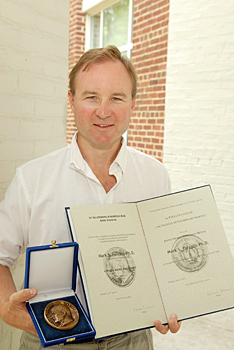The award, a certificate in English and Hungarian and a bronze medal, was presented to Parcells by Laszlo Fodor, dean of the College of Veterinary Medicine at the Hungarian Academy of Sciences, during a conference to mark the 15th Annual Derzsy Days celebration, which recognizes research and service, from June 7-8, in Balatonfured.
Parcells, who has conducted extensive research into mutations in MDV, delivered the keynote lecture on the evolution of Marek's Disease and how the virus is changing in response to vaccination.
Marek's Disease was named for pioneering Hungarian veterinary pathologist, Josef Marek, who described the condition in a landmark 1907 paper and is considered one of Hungary's scientific heroes.
“While Dr. Marek is credited with discovering this virus, that was only one miniscule part of his illustrious career,” Parcells said. “Dr. Marek developed new surgical techniques, designed patented instruments and cowrote a veterinary pathology textbook that was used until the 1960s.”
Parcells earned his bachelor's and doctoral degrees in biological sciences at UD in 1984 and 1994, respectively. Between earning the degrees, he worked as a research technician at the DuPont Co. in immunodiagnostic, signal transduction and immuno-pharmacology laboratories. After receiving his graduate degree in biology, Parcells worked in UD's Department of Animal and Food Sciences until he joined the University of Arkansas as an assistant professor of molecular virology from 1996-2001 and as an associate professor from 2001 until August 2004.
A strong believer in collaboration, Parcells, who joined the UD faculty in 2004, is known for making his laboratory open to visitors and sharing the technology he has developed.
Article by Martin Mbugua
Photo by Danielle Quigley



